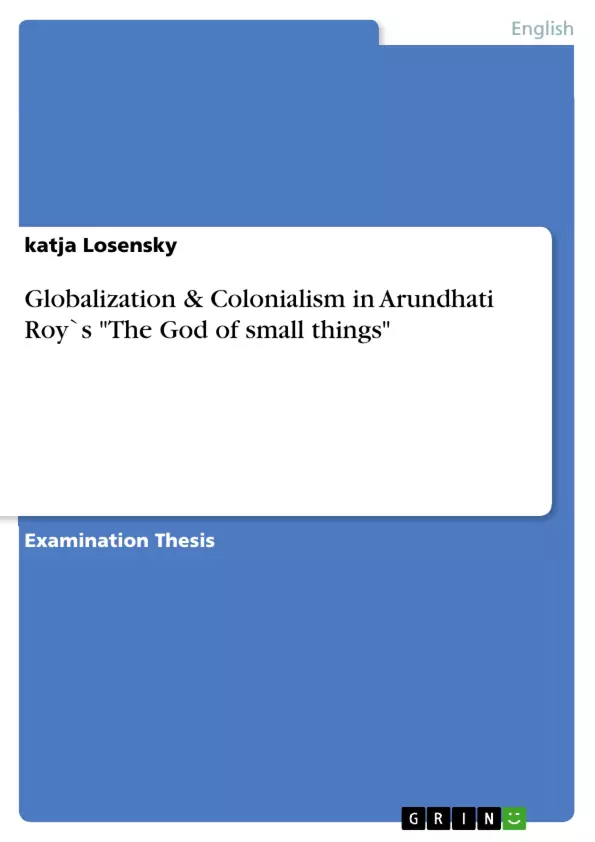In this essay I want to show how globalization and colonialism are phenomenons which cannot be looked at separately when speaking about India`s history and present. Roy`s book does not only reveal the impact of globalization and colonialism on India and its people but the interconnection between these processes. I will give examples of how globalization and colonialism are linked and how that is shown in Arudhati Roy`s novel “The God of Small Things” (1997). This is a semi-autobiographical book which includes examples that draw the authors politial beliefs and understanding of how India has been shaped and is still shaped by globalism and colonialist policies. (Roy: “Is globalisation (sic) about the eradication of world poverty or is it a mutant variety of colonialism, remote controlled and digitally operated?“ For this I will look at India`s economy, India`s role as an exotic Other and the novel`s own position within the global market of literature, the Indian Diaspora, examples for othering, self-othering and inbetweennes, at how and why caste and colonialist ideals still have major impacts on the construction of identity in times of globalization. I cannot give a profound analysis of India`s colonial history and position within the context of globalism, but it will provide backround information and an insight into selected issues that have shaped and still shape India and the Indian society. The major aim of this essay is to show that “India`s colonial histories cannot be ignored”.
Inhaltsverzeichnis (Table of Contents)
- Introduction
- (Market) economy
- Culture (and economy)
- (Modern) diaspora
- Performance(s)
- Anglophone ("Indiaphil?") – (post) colonial identities
- Conclusion
Zielsetzung und Themenschwerpunkte (Objectives and Key Themes)
The essay aims to demonstrate the intertwined nature of globalization and colonialism in shaping India's history and present, particularly in Arundhati Roy's novel, "The God of Small Things." The author will explore the impact of these interconnected forces on India's economy, its role as an exotic Other, and the novel's place within the global literary market. The essay will also examine the themes of the Indian Diaspora, othering and self-othering, and the enduring influence of caste and colonialist ideals on identity formation in a globalized world.
- The intertwined nature of globalization and colonialism in shaping India
- The impact of globalization and colonialism on India’s economy
- India’s role as an exotic Other in the global context
- The influence of caste and colonialist ideals on identity formation in a globalized world
- The role of the Indian Diaspora in shaping contemporary India
Zusammenfassung der Kapitel (Chapter Summaries)
- Introduction: This chapter introduces the essay’s objective, which is to examine the interrelationship between globalization and colonialism in India, as depicted in Arundhati Roy's "The God of Small Things." The chapter also highlights the semi-autobiographical nature of the novel and its reflection of the author's political beliefs. It provides an overview of the key themes that will be explored throughout the essay, including India's economy, its role as an exotic Other, the Indian Diaspora, and the ongoing influence of colonialism on Indian identity.
- (Market) economy: This chapter analyzes the impact of globalization and colonialism on India's economy, focusing on the role of the British East India Company (EIC) and its contribution to the development of a globalized trade network. The chapter examines the historical exploitation of Indian agriculture, particularly the tea and rubber industries, and how colonial policies continue to shape India's agricultural sector even after independence. The chapter further highlights the continuing presence of colonial structures in India's agricultural sector, as evidenced by the persistence of landowning families and the legacy of British boarding schools.
Schlüsselwörter (Keywords)
The primary keywords and focus topics of the text include globalization, colonialism, India, Arundhati Roy, "The God of Small Things," economy, agriculture, tea trade, rubber industry, Indian Diaspora, othering, self-othering, caste, identity, and postcolonialism.
Frequently Asked Questions
How does "The God of Small Things" reflect globalization?
The novel shows globalization not as a new phenomenon, but as a "mutant variety of colonialism" that shapes India's economy, culture, and literature market.
What is the link between the British East India Company and modern India?
The EIC established global trade networks and agricultural exploitations (like tea and rubber) that continue to influence India's economic structures and land ownership today.
What does "othering" and "self-othering" mean in the essay?
It refers to how Indian identity is constructed as "exotic" for the global market and how individuals internalize or struggle with these colonialist and globalized labels.
How do caste and colonialism interact in the novel?
The essay explores how traditional caste hierarchies and colonialist ideals (like British education) persist and intersect to shape identity in contemporary India.
What is the role of the Indian Diaspora in the text?
The diaspora is discussed as a bridge between the local and global, reflecting the "inbetweenness" of postcolonial identities in a globalized world.
- Arbeit zitieren
- katja Losensky (Autor:in), 2008, Globalization & Colonialism in Arundhati Roy`s "The God of small things", München, GRIN Verlag, https://www.grin.com/document/130201



